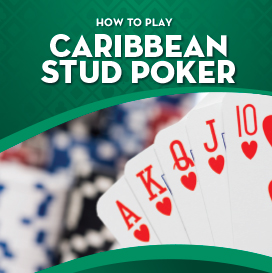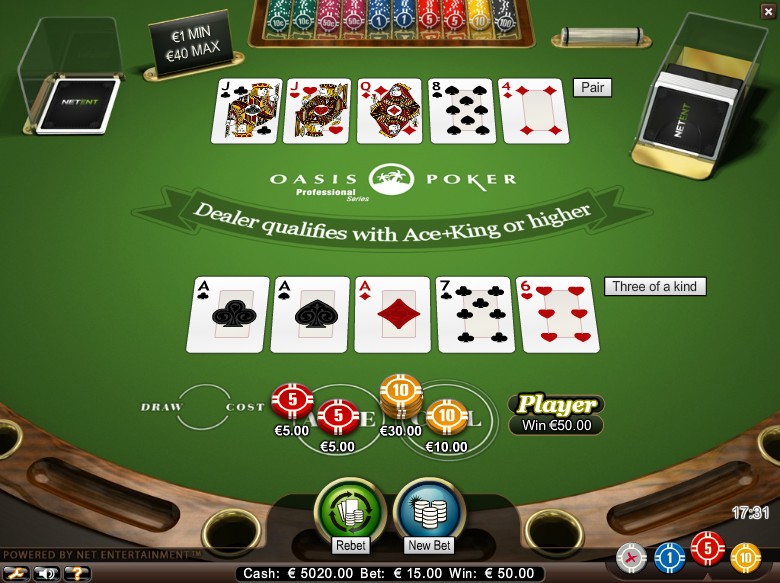Caribbean Stud

Caribbean Stud Poker is a casino table game that closely resembles Five-Card Stud Poker. This game was developed in the 1980’s and was intended to try to entice poker players to play more table games at casinos. David Sklansky has claimed that he is the creator of Caribbean Stud.

If you know the basics of five-card stud poker, you'll fit right in at the Caribbean Stud Poker table. Just remember that you're playing against the Dealer, not the other Players, so you don't have to worry about figuring out everyone else's strategy. Caribbean Stud Poker is a game which unlike Baccarat involves strategy. These strategies can effectively be used to increase your chances of winning the progressive jackpot. We highly recommend that you have a proper read through the various Caribbean Stud Poker strategies before you commence playing our free online version.
A major rule change from Five Card Stud Poker is that Caribbean Stud Poker is played only against the dealer, and not against any of the other players at the table. Due to this aspect of the game, there is no bluffing or other means of deception involved. Considering these features of Caribbean Stud Poker, this game could be a great way for unfamiliar poker players to learn the essence of the game of poker while not being afraid of being less skilled than their surrounding players.
In addition to helping players new to the world of poker, this game also can provide seasoned players with lucrative payouts, should they use some strategies that could elevate their game.
How Caribbean Stud is Played
This game is played on a table specifically made for it, and there are specific areas where certain bets are to be made. In front of each player will be an area for their antes and their bets. Additionally, there will be either an area or a slot which is used for progressive payout jackpot bets, should players feel inclined to make one. At the beginning of each round, players will make their ante to be able to play the game. All antes must be made before the dealer declares “no more bets”; should a player miss this announcement, they will have to wait until the next round in order to play.
At this point, the dealer will deal every player five cards, faced down. The dealer will then reveal their first card to the players. The players will then be able to look at their own cards. It is extremely important that players only look at their own cards and that they do not discuss their hand with anyone else playing at the table.
Based upon what cards each player has, they will then be able to decide whether they want to fold or to bet. Folding results in a loss of the player’s ante and that player must wait until next round to play again. Should a player wager a bet, the bet must be equal to twice the value of the ante. Thus, a $5 ante would require a $10 bet.
After all decisions regarding folding or betting have been made, the dealer will reveal all of their cards.
The dealer can qualify to play past this point only if his hand contains an Ace and a King or forms a pair or anything better than a pair. If the dealer’s hand does not qualify, all antes are paid even money and all bets are pushed. Following the $5 ante example used earlier, this scenario would result in the player receiving their $5 ante plus another $5, as well as reclaiming their $10 bet, thus walking away from that round with $20, and a net of $5.
Should the dealer’s hand qualify, the dealer will begin comparing cards against the players individually, starting with the player farthest right of the dealer. If a player’s card beats the dealer’s, the player will receive even money on their ante and their bet is paid out according to the pay table. Alternatively, a player will lose both their ante and their wagered bet if they lose to the dealer. In the event of a tie, the ante and bet are pushed.
Caribbean Stud Rules
There are some strict rules that must be followed while playing Caribbean Stud Poker. As mentioned above, players are not allowed to discuss their hands to any other players at the table. Violating this rule will result in a dead hand and forfeiture of all bets. Another rule is that players may only have one hand per round. Yet another rule is that players must have all five of their cards in plain sight of the dealer. Additionally, players are not allowed to lift their cards a second time, so players should think carefully of what they are going to do when viewing their cards the first time.
Caribbean Stud Strategies
Using an optimal strategy will result in a house edge of 5.2% of the player’s ante bet. Attempting to use a perfect strategy is probably impossible, but there are some generalizations that players can act upon that can tip the edge in their favor. For example, a general rule of thumb is that a player should never fold if they have a pair or anything higher and that a player should always fold when their hand has anything less than an Ace and a King.
Players can further develop their edge if they maintain an Ace and a King and employ some tactics. For example, if the dealer’s upturned card is an Ace or a King, the player should raise if they have a Queen or Jack (in addition to the Ace and King), as this signifies that the player has blockers on the dealer’s pairs and that the player more than likely has the best Ace-King hand.
Another tactic regarding the Ace-King strategy is to raise if the dealer’s upturned card is between 2 and Queen and the player has a match in their hand. Should a player effectively use the Ace-King strategy, they could see the house edge go down by as much as 2.3%, which can have a substantial effect on their outcomes.
Caribbean Stud Payouts

When a player beats the dealer, the player is given even money on their ante, and the following regarding their bets:
– Royal Flush: 100 to 1
– Straight Flush: 50 to 1
– Four of a Kind: 20 to 1
– Full House: 7 to 1
– Flush: 5 to 1
– Straight: 4 to 1
– Three of a Kind: 3 to 1
– Two Pair: 2 to 1
– One pair or less: 1 to 1
Caribbean Stud Progressive Payout
A Progressive Payout Jackpot is a jackpot that increases a small amount each game, should players elect to take part in it. In Caribbean Stud Poker, players must bet $1 on the jackpot before the dealer announces “no more bets” in order to potentially win the jackpot.
The full jackpot is only awarded to a player who has a Royal Flush. Should the player have a Straight Flush, they will be awarded 10% of the jackpot. Other jackpot winnings are $500 for a Four of a Kind, $100 for a Full House, and $50 for a Flush. These are the payouts for jackpot winners, regardless of the outcome of their bets.
Related Posts:
One time each player cards and the dealer cards are dealt, you will see your own cards, and a card from the dealer turns. This is the key point of the game.
Based on your cards, you can fold your hand, in which case you lose your first bet and participate without more, or you can increase a bet of exactly twice the first bet on the table.
What you choose depends of your hand, and the dealer’s up card.
If your hand is Ace-King high or better (a pair or two pairs) must always increase. If you have an Ace-Queen high and the dealer does not teach any King or Ace the best you can do it is raise. In all other cases, the house edge is kept to a minimum to fold your hand.
Next, the dealer reveals his hole cards. Depends if the dealer has a hand that qualifies or not, it makes a big difference in payments. If the dealer has an ace-king high or better hand qualifies compared to the player’s hand using the standard poker hand rankings. If the player has a better hand then the payments by the increase of the bet is determined by the payment form below. Besides the bet pays 1 to 1!
Caribbean Stud
If the dealer’s hand doesn’t qualify, then no matter what are the players initial bet pays 1-1 and the stake is returned.

Caribbean Studies Syllabus
It can be frustrating when you have a good hand in Caribbean Poker and the dealer does not qualify, although there is always the chance of winning the progressive jackpot on the other.